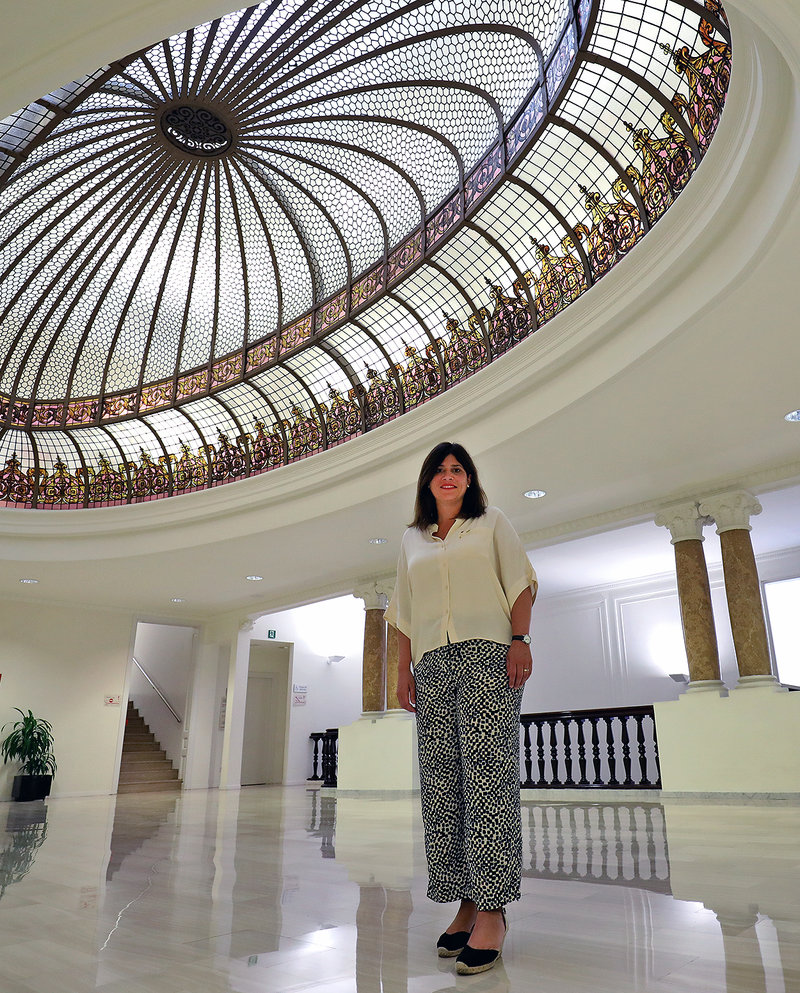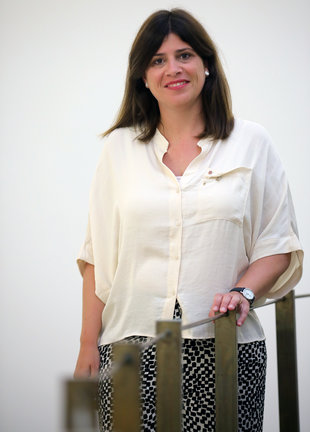Gemma Geis
Catalan Secretary for Research and Universities
“Research should be at the heart of an independent Catalonia”
Gemma Geis (Girona, 1979) is the new Secretary for Research and Universities, having herself been involved in research for years and vice-principal of a university. Such experience has not always been sufficiently valued in political appointments.
After the first hundred days of government, you must now have a good idea of the state of the Catalan university system. What’s your diagnosis?
During these hundred days, our attitude has been to listen very closely, to create this alliance of country that is needed in the field of talent, innovation, research and knowledge transfer, so that all of this is at the heart of it. To be honest, I wasn’t too surprised by what I found. I’ve pretty much confirmed the idea I already had, and that will allow us to move forward with implementation of the policies that need to be promoted.
What will those policies be?
There are two basic issues. How to ensure that all the knowledge that exists in the country in the field of research, which is a lot, undergoes a generational handover. This is directly related to another issue, which is attracting talent, retaining talent and recovering talent that has left. This is all related. If we pursue generational policies, we are automatically in a better position to retain and attract talent. And there’s also a third issue, which is the need to improve infrastructure, both scientific and in general.
Are there enough financial resources to do this? And are resources enough?
In the country that some of us see, what we need is independence. With all the tools of an independent state, the country could make an impressive leap in terms of the knowledge society.
What tools don’t we have?
More funding is needed. And we must also denounce recentralisation policies, both in the scientific field and in reference to Next Generation funds, which is based on everyone getting the same. When Catalan universities compete on equal terms in Europe, they are the ones that get the most European funds, whereas sometimes in Spain they do not. There is not only a lack of funding but of better funding of public universities and research centres. Because returns from public funding for research far exceed the money spent. It’s not an expense, it’s an investment. We have seen this with the pandemic. Research that is transferred to society, in health, in energy transition, in the fight against climate change, all of this is the result of a necessary public investment.
You have talked about the flight of talent or brain drain. Is it necessarily bad to export talent, or is the problem not compensating by attracting outside talent here? Because the talent that comes back has broadened their horizons learning abroad and at some point comes back with all the accumulated baggage, which is positive, right?
The world of Catalan research is fully internationalised. Researchers do research abroad, have international relationships that enhance their development as researchers. The problem is that these people are sometimes forced to leave, because they have no alternatives here, because of the working conditions. This cannot be viewed as internationalisation, but a flight of talent. We must ensure that people who want to carry out research work in this country are able to do so. And those people who want to leave for a while and come back, of course, they have to be able to do that.
Is Catalonia an attractive country for scientific and university talent?
I think so, what’s happening is that the EU countries and world’s leading countries in general are investing a lot in research and innovation. And so we not only have to invest in it, we have to shorten the gap as much as possible to keep up. We can’t lose momentum. What is required is a decision tailored to the needs of Catalonia to invest as much as possible in these policies. The country’s infrastructure needs to be top notch.
Is public funding enough? Should all funding be public?
We need to work on the issue of patronage. Without complicating matters, public funding must be possible, because the country believes in research, but in addition, and with the pandemic we have also seen works funded by public-private collaboration. Although that doesn’t mean there shouldn’t be accountability and limits.
Why is there such rejection of private investment in some sectors, when it works smoothly in the advanced international arena?
I don’t know. I don’t see it as a bad thing provided the concept of public service is maintained, guaranteeing fundamental rights.
Can private patronage condition what research is done, focusing it on business interests?
Companies have seen that investing in research leads to faster solutions.
But basic research is not the same as applied research.
I believe that everyone – including companies – knows there is a need for basic research. Because without being good at basic research it is very difficult to be strong at applied research. All types of patronage should be possible and we will work to strengthen this area.
The Catalan university system is getting old. I say that because in the 1990s there was a boom of new faculty members and researchers, but now there seems to be a generational blockage.
Replacement quotas set by the Spanish state make renewal difficult. And when you look at the principals, they complain about the average age of the faculty.
These are the same principals that replace retirees with professors on temporary contracts.
Well, because temporary places and permanent places depend on quotas, and the Spanish government has been uncompromising in this regard. What the principals would like is for restrictions on replacements to be removed, so that they can have more permanent positions. If the replacement quota was eliminated, the principals would have many more tools to ensure better conditions and generational renewal.
The replacement quota is the ratio that determines the number of employees who can join the public administration depending on the number of people leaving. For those of us unfamiliar with it, can you tell us how it works?
This affects the entire civil service. In the university world it means that yes, for example, twenty professors retire, and they only let you create two full-time positions, because you can’t fill a hundred percent of civil servant jobs. It’s been like this for many, many years. The replacement quota has been as low as zero, or 10%. And this affects not only the faculty, but also the university administration and service staff, which is very important. And this is why we end up with so many temporary employees.
Doesn’t this affect the quality of university education, as well as causing great job insecurity?
It is detrimental to guaranteeing the solidity of the chain of knowledge transfer, because it blocks the generational handover, and perpetuates interim positions. The average age at which a professor manages to get tenure is very high.
Isn’t university education too focused on the job market?
Subjects cannot only be determined by the market. When there is public funding, it is important that university studies lead to employability, it’s a demand of society. But there’s also a balance with subjects that are not as focused on employability, but form part of the model of developing knowledge in the country and educating citizens.
Are double degrees that combine a technical degree with a humanities degree a good way of achieving this?
When it comes to finding a job, specific subjects aimed at the workplace are valuable, but so is a cross-disciplinary education. I think a double degree in economics and philosophy is very interesting, for example. Or electronic engineering and business organisation and management. Universities are already rethinking Bachelor’s and Master’s degrees to adapt them to the needs of the market, but also to the general right to access knowledge, which I personally applaud.
Should there be access to knowledge in Catalan? Or will the phrase attributed to Adolfo Suárez end up being true, that chemistry cannot be taught in Catalan? You’ve already talked to the Culture Secretary about this, who has announced a major language standardisation programme, right?
We’ve talked to the Education Secretary. There is a demand for this from the faculties of Education, because students often arrive with a very low level of Catalan. Catalan is the vehicular language of universities in Catalonia, and this is our mandate. We’re now working with the Department of Education and when this more general “shock plan” is decided, we’ll work on it. But my commitment to the language is so strong that I haven’t waited. We’re working to ensure that students are taught in Catalan, to strengthen Catalan in research, to strengthen the Live Catalan University Network. And I know that the university principals are firmly committed to it. International research is compatible with the use of the Catalan language. We will, of course, collaborate with all departments on this, but we have already begun to act.
With so many changes of government and redistribution of departments, even when the governing party is the same, there’s a feeling that it’s difficult to consolidate policies in the medium or long term.
For those of us from the academic world, more than pure and simple politics, the values that guide us are those of good preparation and efficiency. We’re very clear about the axes we want to work on.
Are they strong enough that when someone else arrives, even if they are from another party, they can be maintained, or will they be changed again?
I think so. And I think we have to prepare the country for independence. It may not happen, but I am committed to it, because I believe that research, knowledge transfer and innovation must be at the heart of an independent country. And that can attract a lot of people.
interview Gemma Geis
interview GEMMA GEIS
Captain of the ship
To say that Gemma Geis i Carreras (Girona, 1979) is captain of the Catalan university ship is more than just a metaphor, as the department currently occupies the original building of the shipping group Compañía Transmediterránea. Under the spectacular stained glass skylight in the shape of an inverted boat hull that presides over the noblest floor of the monumental building located at the bottom of Via Laietana, the public planning of this strategic sector is led by an expert in the subject matter. A Doctor of Law and specialist in administrative law, Geis has previously been a researcher and still is a member of a Research Group in Urban Law. She has been vice-principal of the University of Girona and also knows first-hand the difficulties of making her way through the current precariousness of university teaching. Surrounded by colleagues mostly of Girona origin, her appointment to this position was preceded by a term as an MP for Junts per Catalunya and by two easy electoral victories as head of the list for Girona, where her party, that of president Puigdemont, had the highest margin of victory over the left-wing opposition.




